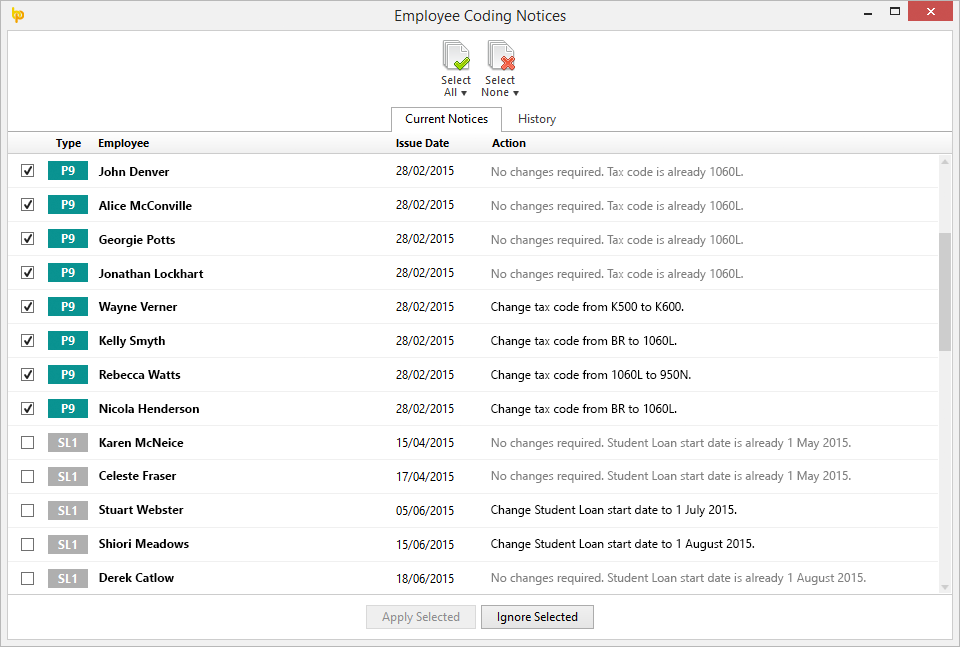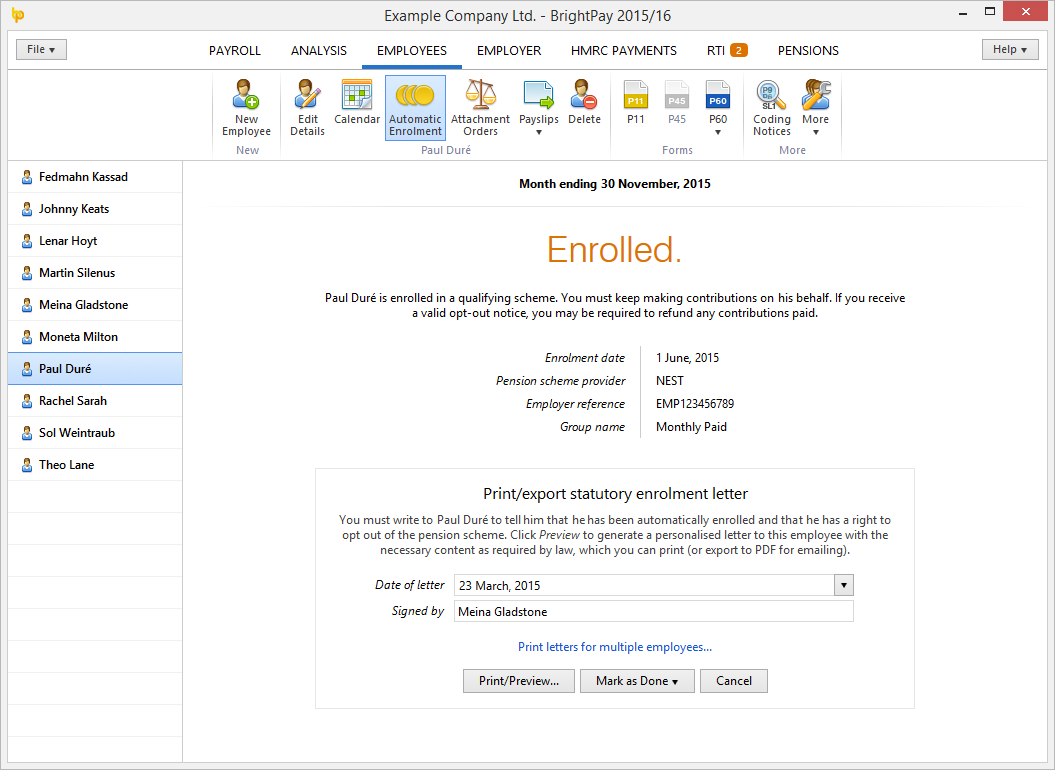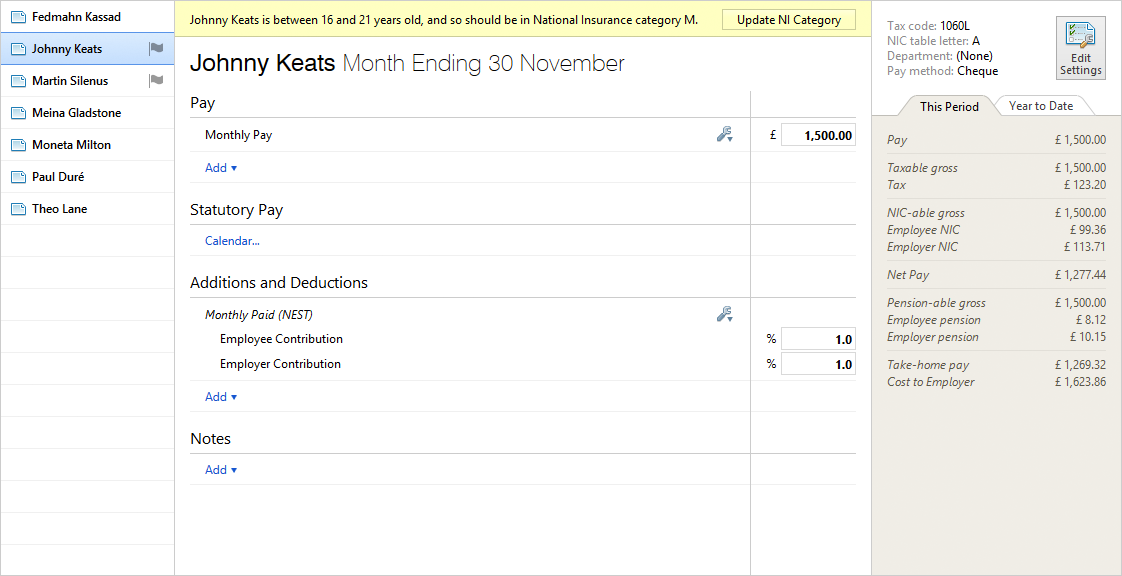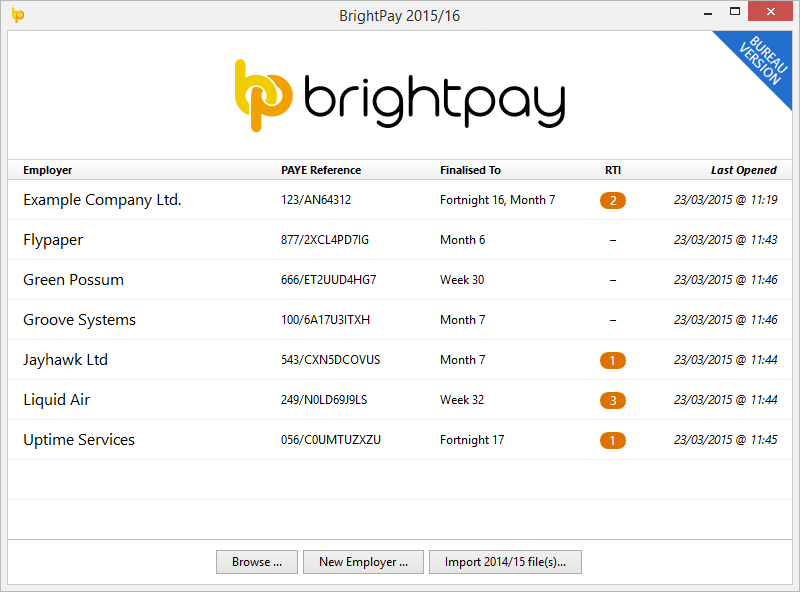Mar 2015
23
BrightPay 2015/16 is Now Available. What's New?
BrightPay 15/16 is now available to download. Here’s a quick overview of what’s new:
2015/16 Tax Year Updates
- 2015/16 rates, thresholds and calculations for PAYE, National Insurance contributions, Student Loan deductions, Statutory Sick Pay, Statutory Maternity Pay, Statutory Adoption Pay, Statutory Paternity Pay, and Statutory Shared Parental Pay.
- The emergency tax code has changed from 1000L to 1060L.
- Support for the newly introduced National Insurance category letters for employees under 21 years old:
- M – Standard rate contributions
- Z – Deferred rate contributions
- I – Contracted-out Salary Related standard rate contributions
- K – Contracted-out Salary Related deferred rate contributions
- Eligible employers can continue to claim the £2000 Employment Allowance which can be used to reduce Employer Class 1 Secondary NICs payments to HMRC.
- Updated P11, P45, P60, P30 and P32 forms.
- Updated RTI submissions in line with the latest HMRC specifications. BrightPay continues to be officially HMRC Recognised for all RTI submission types.
PAYE Coding Notices
BrightPay 2015/16 includes the ability to retrieve and process employee PAYE coding notices directly from HMRC (P9, PB, P6B, SL1, SL2).

To use this feature, ensure the notice options in your HMRC PAYE dashboard are all set to Yes. Only new coding notices issued after this instruction will be available for download.
Shared Parental Leave
Shared Parental Leave (SPL) is a new legal entitlement for eligible parents of babies due (or children placed for adoption) on or after 5 April 2015. SPL lets parents choose either to have one parent take the main child caring role, or to share the child caring responsibilities evenly, depending on their preferences and circumstances. Unlike maternity/adoption leave, eligible employees can stop and start their SPL and return to work between periods of leave.
BrightPay 2015/16 has full support for Shared Parental Leave and Statutory Shared Parental Pay (ShPP).

Pensions and Automatic Enrolment
With the first wave of small employers (i.e. those with less than 50 employees) set to stage for Automatic Enrolment in January 2016, this tax year will be busy.

We first introduced support for Automatic Enrolment in BrightPay 2014/15, providing the ability to set up qualifying pensions schemes, assessment, postponement, enrolment, opt-ins, opt-outs, employee communications, and more. We have dedicated support for NEST, NOW: Pensions, The People's Pension and Scottish Widows.
In BrightPay 2015/16 we have improved Automatic Enrolment support and added several new features:
- There is now a dedicated PENSIONS tab for setting up Automatic Enrolment in BrightPay, adding/editing pensions schemes, and exporting enrolment and contribution files.
- Batch processing – multiple employees can now be postponed or enrolled (and as well as other actions) together in a single click. Multiple communications can be printed together.
- Ability to override BrightPay's assessment of an entitled worker or non-eligible jobholder (e.g. if the employee's pay would normally put them in a different category).
- Ability to continue enrolment from a previous tax year or continue enrolment from other payroll software.
We'll be continuing to update Automatic Enrolment during the 2015/16 tax year and provide dedicated support for more pension scheme providers.
Improved Reminders
For years, BrightPay has given reminders of important actions and detected potential data errors as you process your payroll. In 2015/16, we've improved the system to handle even more reminders and give much improved visual feedback.

New Start-up Window
Standard and Bureau users alike will benefit from the extra employer information included in the new BrightPay start up window:

Other 2015/16 Changes in BrightPay
- Ability to batch print, email or export one or multiple payslips for a single employee.
- Automatic prompt to create an EPS when recoverable amounts are detected in an HMRC payment.
- A new summary of calendar events in the current period for the currently selected employee appears in the bottom right of main payroll screen.
- Support for Direct Earnings Attachment orders.
- New ability to set up an addition or deduction to repeat to a date beyond the current tax year.
- Improved Statutory pay descriptions.
- New ability to hide 'zero' payments, additions and deductions on printer (or emailed/exported) payslips.
- Employer's HMRC Sender password is now securely masked in the BrightPay user interface.
- Lots and lots of minor improvements throughout the entire BrightPay user interface, as well as the latest bug fixes.
BrightPay 15/16 is the same price as BrightPay 14/15 (including FREE for small employers with up to three employees). Support will continue to be free of charge for all users.
Mar 2015
16
HMRC explains disputed charges
HMRC says payroll managers must appeal disputed charges as soon as they receive them and has outlined a common reason they may occur.
Addressing delegates at Ceridian’s annual conference last week, Phil Nilson, from HMRC’s customer and stakeholder engagement team, explained that disputed charges may occur due to a misunderstanding by payroll managers.
He said: “We used to reconcile annually and you used to send us money during the year. You didn’t send any information relating to that money until the end of the year when you submitted your P14s and P35. Only at that point could we start reconciling the money with the information.
“Now, thanks to RTI we are doing that on a monthly basis, we are doing it tax month by tax month.
“Using tax month one as an examples from 6th April to 5th May, HMRC looks at all the Full Payment Submissions (FPS) you have sent in month one on either the 6th, 7th or 8th of May, and then starts the reconciliation process to try to determine the charge that is due.
“Once you’ve sent your FPSs, in an ideal world, they will be visible to you from the 12th of the following month on your dashboard. So in the example used that would be from the 12th of May. So, theoretically, you would send in your FPSs and then by the 12th of May you could go online and could see what we think is due from you.
“But, sometimes things come in late and you may need to send information about payments beyond the end of the tax month, but which relate to the earlier tax month.
“This is vital. If an FPS comes in between the 6th and 19th of May you can put it back into tax month one, where it should be, and the charge will be adjusted accordingly. However, if that FPS comes in after the 19th of the following tax month it won’t go into the dashboard for that month, of tax month one in this case, because the 19th is the cut-off date – the date we want the payment in.
“That may affect your view of what you think is due and we think is due.
“By looking at FPSs it gives us the total amount that is due – but to be taken away from that is anything you want to claw back by way of the Employer Payment Summary (EPS), that should be submitted by the 19th of the following month. So, for tax month one, that will be the 19th of May. In terms of looking at your online account, if you sent that EPS before the 12th of May it will be reflected by the 14th – you will see it within two days.
“I hope that helps you get a better understanding of what we do.”
Article taken from www.payrollworld.com
Mar 2015
13
Auto Enrolment – Are you covered?
Every employer in the UK will have to enrol their employees into a pension scheme and they must contribute towards that pension. This process is called Auto Enrolment. Employers will need to prepare for their new Auto Enrolment duties and responsibilities or face hefty fines. There is a lot of uncertainty, ambiguity and doubt surrounding Auto Enrolment for employers.
However, there is a clear opportunity for bookkeepers, accountants and payroll bureaus to capitalise on these new obligations for their clients. Contrary to popular belief, confusion isn't a bad thing. In fact, confusion can work to your advantage. It can be a platform for payroll providers to demonstrate their automatic enrolment expertise and knowledge to their clients. This knowledge will position you as a credible and reliable authority on employer responsibilities.
Opportunity Knocking
Pension schemes will become a part of day to day life for each and every employer in the UK. Thousands of employers will begin to look to auto enrolment experts for advice, counsel and an easy solution. Employers that previously did their payroll in house may look to outsource this role to a payroll and auto enrolment expert. Payroll providers will be able to help them grasp the implications for their business and prepare them for their automatic enrolment responsibilities.
Payroll providers who offer auto enrolment services will naturally gain a competitive advantage, win new business and ultimately increase profits. According to The Pensions Regulator research 78% of small businesses will rely on their advisors for help, advice and support.
Win New Clients
Presumably you have worked hard to win and gain new clients. But now you've got those customers, how do you keep them? The downfall for many bureaus is that they don't know how to keep customers. Time and money goes into acquiring new customers and the last thing you want is to see them sneaking out the back door.
Keeping customers makes good business sense but it's not always easy. Being open for Auto enrolment business will play an important role in customer retention over the next few years. This will give payroll providers an edge over other bureaus who are shying away from AE and will provide the capacity to generate greater value for their clients.
There is a clear opportunity to financially benefit from AE by offering to handle all auto enrolment duties for your clients. Your services can lighten the load for employers. There is a pot of gold at the end of the rainbow and it’s up to you to grab it with both hands.
BrightPay has you covered!
To take advantage of this business opportunity, bureaus need to have a payroll solution that can automate the AE tasks. BrightPay is a payroll solution that has automatic enrolment process driven automation included for free. This simple solution handles the complex process of auto enrolment with ease. It's easy with BrightPay, simply enter your staging date and BrightPay will automatically let you know what you need to do to enrol the employees.
BrightPay automates the employee assessment for you by accessing each employees PAYE information and informing you what your duties are for each employee. It further can produce personalised employee communication based on the employee's work status which can be printed or emailed. Additionally, postponement, refunds, opt-out, opt-ins and required reporting come as standard. BrightPay is integrated with a number of AE pension providers.
What’s more is there are no additional costs for automatic enrolment functionality and support is completely free. Our 60 day trial will prove how easy it really is.
To arrange a demo click here







